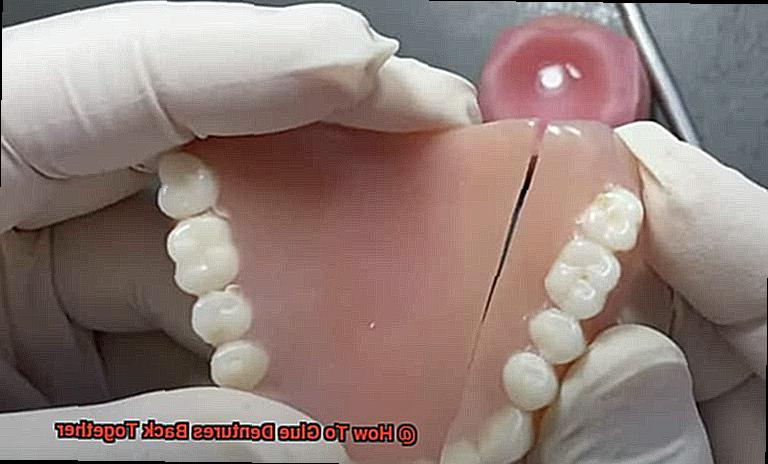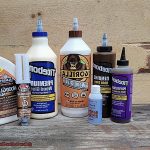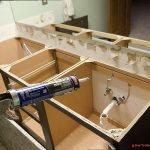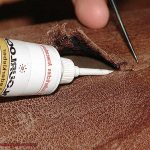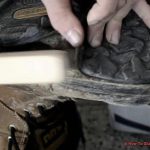Dentures are essential for those who wear them, but they can also be delicate and prone to breaking. When your dentures break, it can be a nightmare that affects your ability to chew food, speak properly, and maintain your confidence. Fortunately, there’s no need to panic because you can glue dentures back together with ease. In this article, we’ll guide you through the essential steps you need to take when repairing damaged dentures.
Maybe you’ve accidentally dropped your dentures or damaged them while cleaning. Whatever the cause of their breakage, repairing your dentures can save you time and money by preventing multiple trips to the dentist. Repairing your dentures at home is not as daunting as it may seem. With the right tools and techniques, you’ll be done in no time.
This article will walk you through the necessary steps involved in gluing dentures back together. We’ll cover everything from the materials required to how to prepare the dentures and the actual gluing process itself. Additionally, we’ll provide some crucial tips on how to prevent future damage from occurring so that you won’t have to go through this ordeal again.
So if you’ve ever found yourself in a situation where your dentures have broken apart, keep reading. This guide will show you how easy it is to fix them yourself without having to go through the hassle of getting them professionally repaired.
What Are Dentures?
Contents
- 1 What Are Dentures?
- 2 Reasons for Broken or Cracked Dentures
- 3 Should You Glue Your Dentures Back Together?
- 4 Gathering the Necessary Materials
- 5 Step-by-Step Guide to Gluing Your Dentures Back Together
- 6 Cautions to Take After Repairing Your Denture
- 7 Alternatives to Gluing Your Denture Back Together
- 8 Conclusion
Dentures are a game-changer for people with missing teeth. They are prosthetic devices that mimic the look and feel of natural teeth, crafted from a range of materials like acrylic, porcelain, and resin. The result? A custom-fit set of teeth that can help restore your smile, confidence, and oral function.
There are two types of dentures: complete and partial. Complete dentures work best when all teeth are missing, while partial dentures come into play when you have a few gaps to fill. Partial dentures are attached to existing natural teeth using metal clasps or other attachments.
The benefits of dentures go beyond aesthetics. Dentures can enhance your smile, make it easier to eat and speak, and prevent remaining teeth from shifting out of place. But to keep them working properly, you need to maintain and care for them regularly.
Some people may be tempted to glue their dentures together as a quick fix, but this is not recommended as it can affect the fit and functionality of the denture. Instead, consult with a dental professional for proper repair.
Overall, dentures are an effective option for patients with missing teeth who want to restore their oral health and function.
Reasons for Broken or Cracked Dentures
Dentures are a crucial part of many people’s lives, helping them to eat, speak, and smile confidently. However, like any superhero, dentures can have their weak points. In this section, we’ll explore the top six reasons why dentures may break or crack.
- Firstly, accidents happen, and dentures aren’t invincible. Dropping your dentures or accidentally hitting them against a hard surface can cause them to crack or break. Dentures require proper care and handling to avoid damage.
- Secondly, poor fit can lead to discomfort and problems. If your dentures aren’t fitted properly, they may become loose and shift around in your mouth. This can cause undue pressure on certain areas, leading to cracks or fractures.
- Thirdly, wear and tear is inevitable with regular use. Just like a superhero’s suit can become worn down from battling villains every day, dentures can also become weakened over time due to exposure to acidic foods and beverages. This makes them more prone to breaking.
- Fourthly, age can play a role in the wear and tear of dentures. As they age, they may become more brittle and prone to cracking, especially for dentures made from acrylic materials that tend to shrink over time.
- Fifthly, improper cleaning can lead to bacteria and plaque buildup that can weaken the structure of the dentures over time. Neglecting to clean your dentures properly can lead to damage or breakage.
- Lastly, dry mouth can increase the likelihood of your dentures cracking or breaking. Saliva helps to lubricate the mouth and protect the dentures from damage. If you suffer from dry mouth, it’s important to discuss it with your dentist.
By understanding the reasons behind broken or cracked dentures, you can take steps to prevent these issues from occurring. Proper handling, regular cleaning, routine dental check-ups, and ensuring a good fit can all help keep your dentures in good condition.
Should You Glue Your Dentures Back Together?
Your dentures are an essential part of your daily routine, so it’s understandable why you might be tempted to glue them back together when they break. However, before you reach for the glue, there are some important factors to consider.
Firstly, it’s crucial to understand why your dentures broke in the first place. If it was due to regular wear and tear or accidental damage, gluing them back together may be a viable option. But if the breakage is due to underlying issues like poor fit or structural damage, gluing them back together could be a temporary fix that could lead to further problems down the line.
Secondly, the type of glue you use matters. While it might be tempting to reach for any household adhesive, it’s vital to use a dental adhesive specifically designed for denture repair. These specialized adhesives are safe for oral use and won’t harm the denture material or your mouth.
It’s also important to note that gluing your dentures back together can affect their fit and function. Even if the repair seems successful, the dentures may not fit correctly, causing discomfort or further damage.
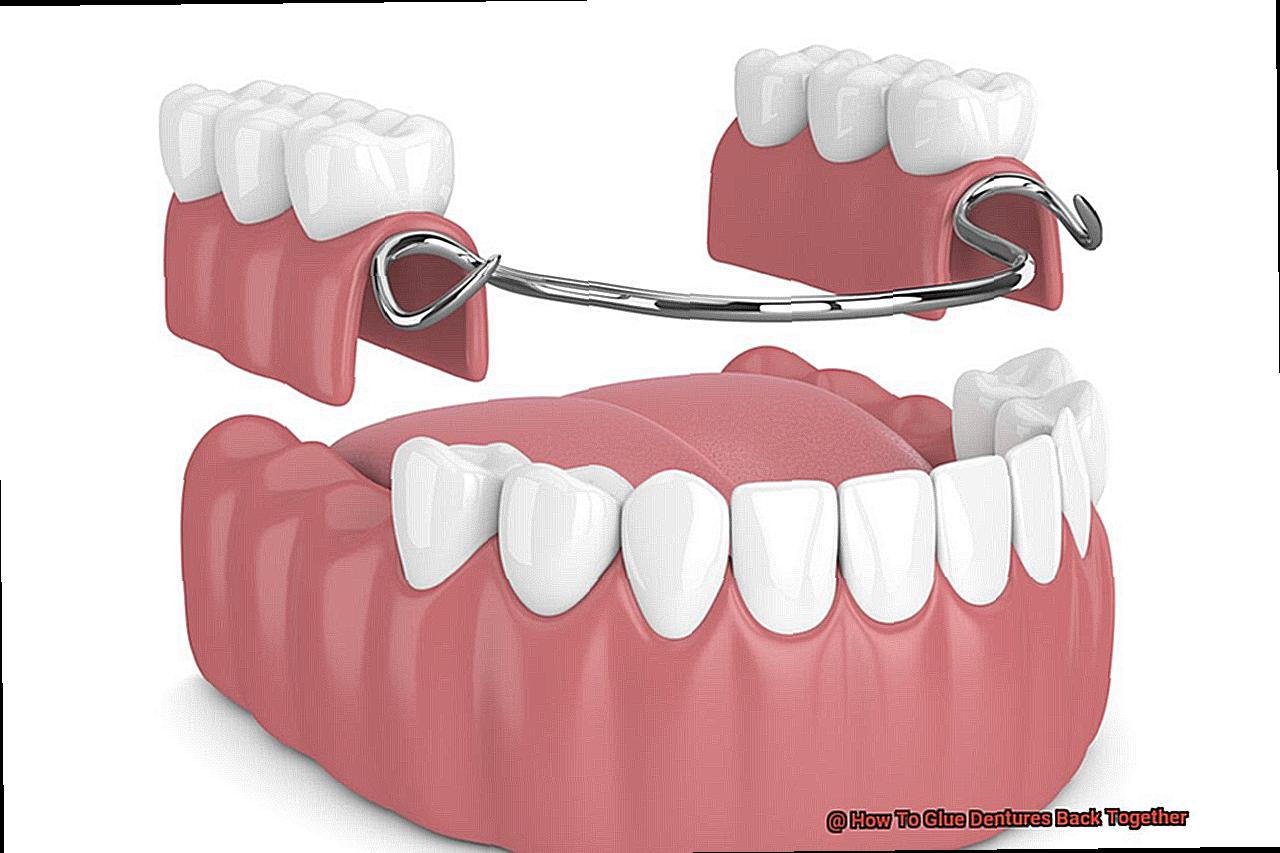
That’s why we always recommend consulting with a dental professional before attempting any repairs. They can assess the damage and provide recommendations on whether repair or replacement is the best option for your specific situation.
Gathering the Necessary Materials
If you’re dealing with broken dentures, the first step in fixing them is to gather all the necessary materials. Don’t rush into the repair process before ensuring you have everything required for a successful outcome.
The primary material you’ll need is denture adhesive. Choose a product specifically designed for dentures and that will provide a strong and lasting hold. There are different types of adhesives available, including paste, powder, and strips. Read the instructions carefully to determine which type is best for your situation.
Scissors are also necessary as you may need to trim any excess adhesive from your dentures after gluing them back together. A pair of scissors can be highly useful in this process.
Since denture adhesive can be messy and difficult to clean off your hands, wearing rubber gloves can help protect your hands from the adhesive.
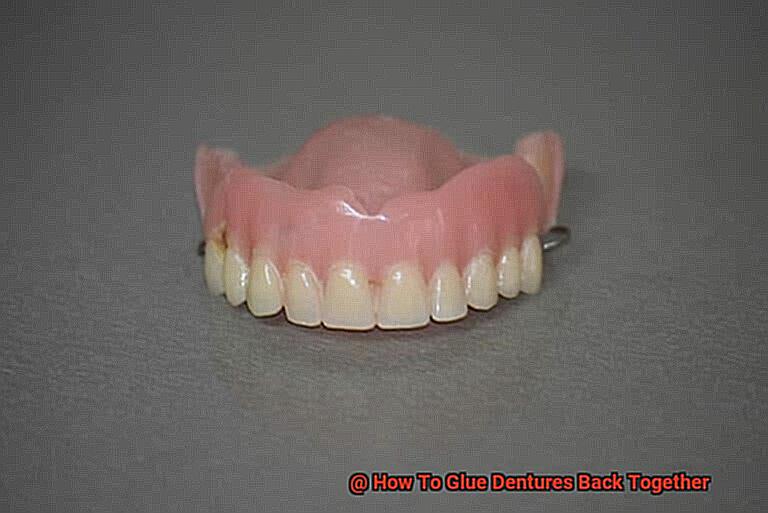
Before fixing your dentures, ensure they are clean and dry. Use a clean cloth or paper towel to wipe away any debris or moisture that may impact the adhesive’s effectiveness.
While gluing your dentures back together, using a mirror can be really beneficial. It will allow you to see exactly where the pieces fit together, ensuring a more precise repair.
By gathering all of these materials before starting the repair process, you’ll have everything you need to complete the task successfully and efficiently. Don’t let broken dentures ruin your day – with the right materials and a little patience, you can have them looking and feeling like new again.
Step-by-Step Guide to Gluing Your Dentures Back Together
With some basic materials and careful attention to detail, you can glue your dentures back together yourself. Here’s a step-by-step guide to help you get started.
Step 1: Assess the Damage
Before you begin, assess the damage to your denture. If the damage is significant, it’s best to seek professional help from a dentist or denture specialist. However, if the damage is minor and you feel confident in your abilities, you can attempt to repair the denture yourself.
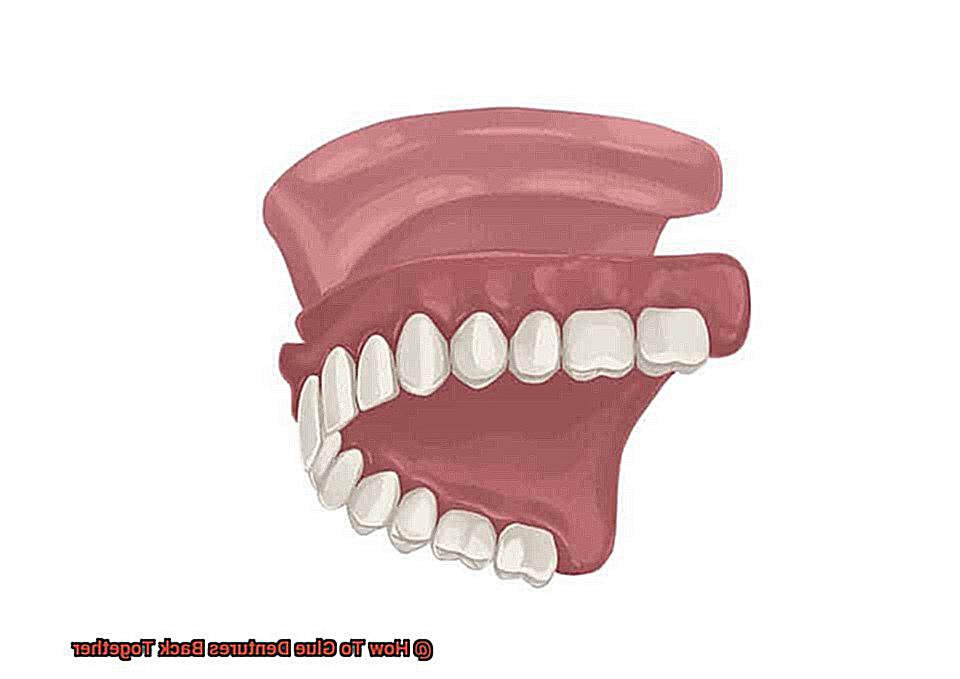
Step 2: Gather Materials
To get started, gather all necessary materials such as dental adhesive, a clean towel, and a toothpick. Make sure to use dental adhesive specifically designed for dentures as regular superglue or household adhesives can be harmful if ingested.
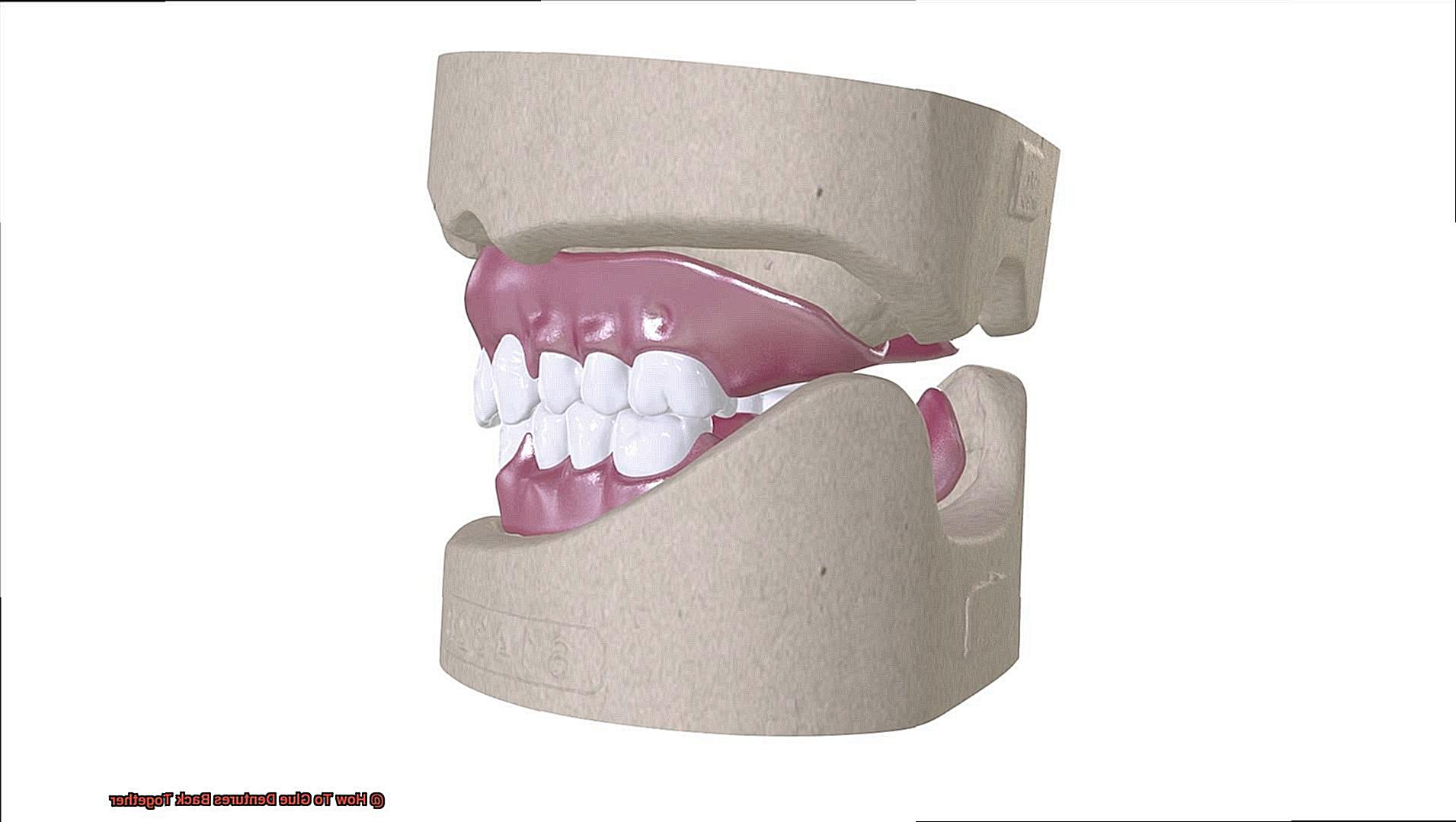
Step 3: Clean and Dry Broken Surfaces
Carefully clean and dry the broken surfaces of the denture. This will help ensure that the adhesive bonds properly.
Step 4: Apply Adhesive
Using a toothpick, apply a small amount of dental adhesive to one of the broken surfaces. Be sure not to use too much adhesive as it can cause excess material to seep out and make it difficult to fit the denture back together.
Step 5: Press Surfaces Together
Press the broken surfaces together firmly and hold them in place for several minutes until the adhesive sets. Wipe away any excess adhesive with a clean towel.
Step 6: Handle with Care
It’s important to note that even with proper adhesive and careful application, repaired dentures may not be as strong as they were before the damage occurred. Therefore, it’s crucial to handle repaired dentures with care and avoid putting excessive pressure on them.
Repairing your broken dentures is possible with some basic materials and careful attention to detail. So, don’t let a broken denture break your spirit. Follow these steps, and soon you’ll have your dentures looking and feeling like new again.
However, if you’re unsure about your abilities or the extent of the damage, don’t hesitate to seek professional help.
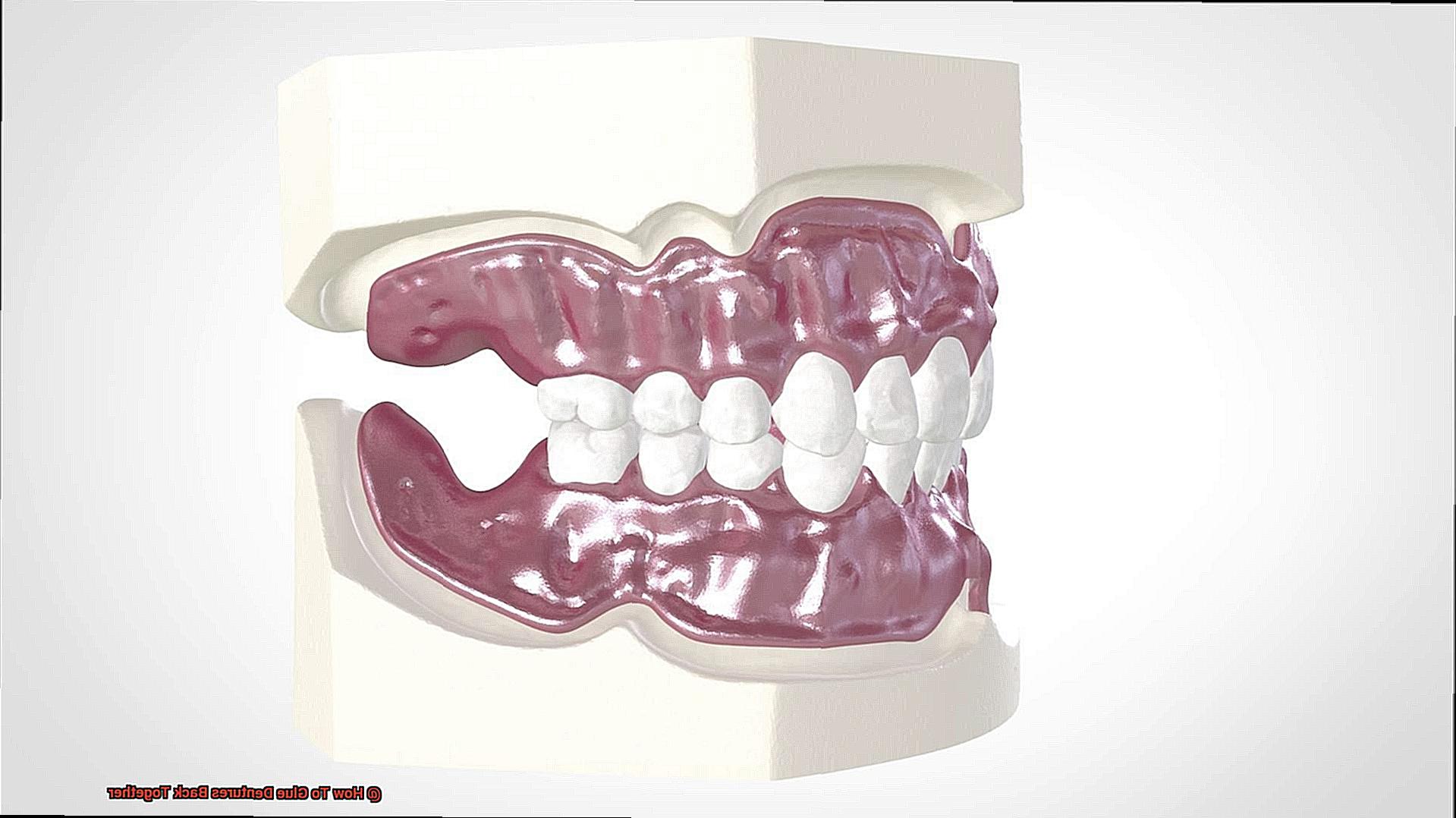
Cautions to Take After Repairing Your Denture
Well done on successfully repairing your dentures. However, it’s important to remember that your hard work isn’t over yet. To ensure that your newly mended dentures last longer and function correctly, there are a few crucial precautions you ought to keep in mind.
Firstly, you must avoid using harsh cleaning agents or abrasive materials on the repaired area. Such products can cause further damage and weaken the bond created by the glue. Instead, opt for gentle cleaning agents and soft-bristled brushes that will keep your dentures clean without harming them.
Secondly, it’s best to steer clear of consuming hot or hard foods for several hours after repairing your dentures. This will give the glue sufficient time to set and bond accurately, ensuring that your dentures stay in place and don’t fall apart again.
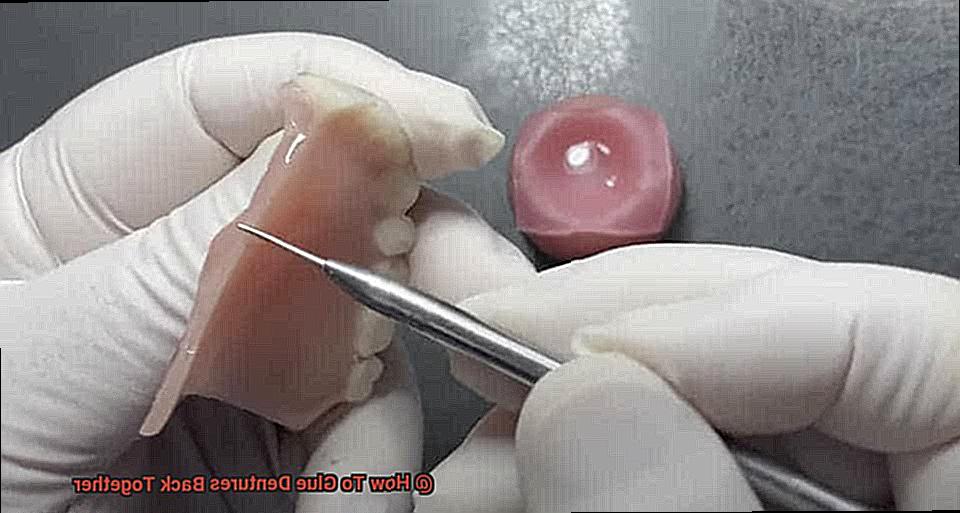
Thirdly, it’s essential to check your repaired dentures regularly to ensure that they remain in excellent condition. If you notice any cracks or chips in the repaired area, it may be time to re-glue them or seek professional help from a dentist immediately.
Lastly, it’s vital to remember that gluing your dentures back together is a temporary solution. For a more permanent solution, seeking professional help from a dentist is always the best option.
Alternatives to Gluing Your Denture Back Together
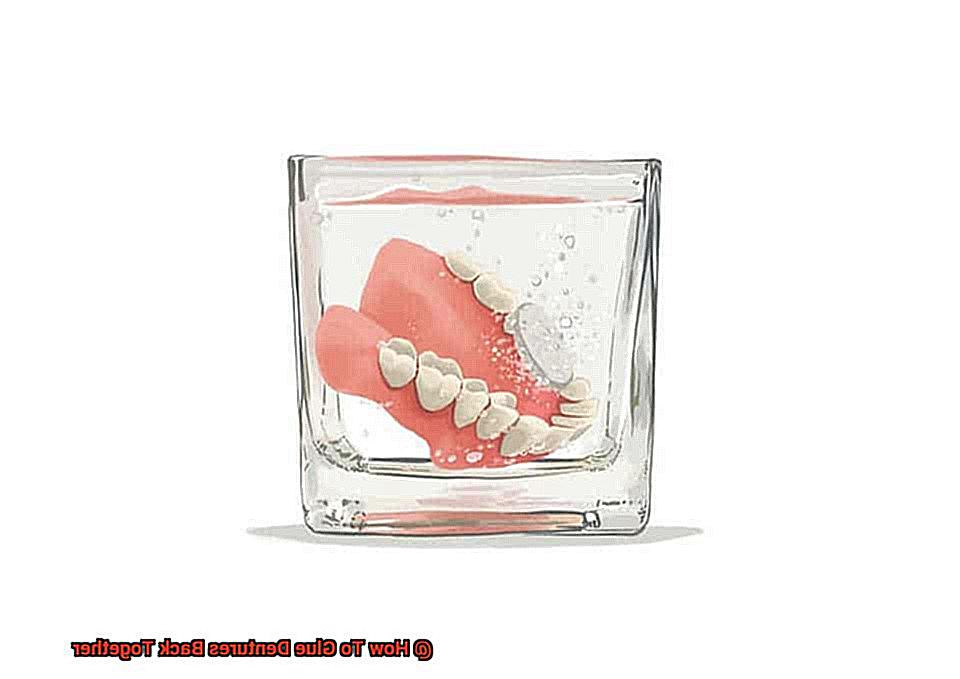
While it may be tempting to try a quick fix at home, there are safer and more effective alternatives to consider.
One option is to take your dentures to a professional repair service. These experts have the knowledge and equipment needed to properly repair your dentures without causing further damage. By entrusting your dentures to a skilled technician, you can avoid potential complications such as irritation or infection. Plus, you can rest easy knowing that your dentures will be repaired correctly.
Another alternative is to invest in new dentures altogether. Although this may come with a higher price tag, it can be worth it in the long run if your current dentures are old or damaged beyond repair. Not only can new dentures provide a better fit and improved functionality, but they can also enhance your overall quality of life.
It’s crucial to understand that attempting to repair your dentures yourself can lead to additional damage and may not be effective in the long run. Seeking professional assistance is always the best course of action when it comes to repairing dental appliances such as dentures.
While gluing your dentures back together may seem like a quick fix, it’s important to consider the alternatives available. By taking your dentures to a professional repair service or investing in new ones, you can ensure a more permanent solution that prioritizes your oral health and overall wellness.
bQ85B8QzN3s” >
Conclusion
In conclusion, dentures play a crucial role in the lives of those who wear them. However, they are also prone to breaking due to various reasons such as accidents, wear and tear, age, poor fit, improper cleaning, and dry mouth. If your dentures break, it can have a significant impact on your daily life by affecting your ability to chew food or speak properly.
Fortunately, gluing dentures back together can be an easy fix. But before doing so, it’s essential to understand why your dentures broke in the first place to prevent future damage from happening. By taking proper care of your dentures through regular maintenance and handling them with care, you can avoid any potential mishaps.
While repairing your dentures at home may seem like a quick solution, it’s important to consider seeking professional assistance for a more long-term fix. Gluing them back together could lead to further problems down the line.
However, if you feel confident in your abilities and want to repair them yourself at home, our step-by-step guide will help you do so effectively. Just remember that if you’re unsure about the extent of the damage or don’t feel comfortable repairing them yourself, don’t hesitate to seek professional help.
In summary, by following these tips and precautions after repairing your broken denture carefully with glue or other methods available in the market today; you’ll have them looking and feeling like new again in no time.

